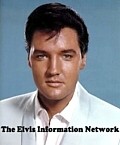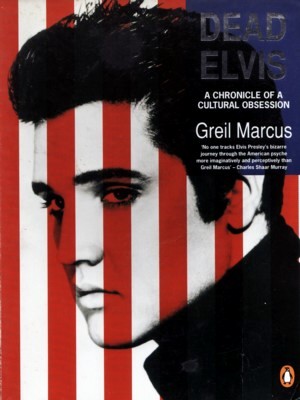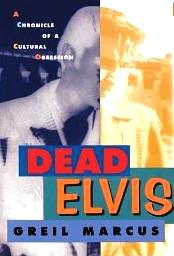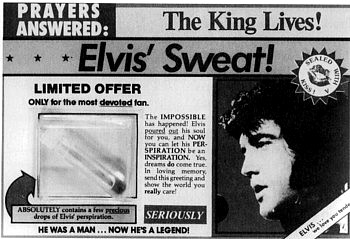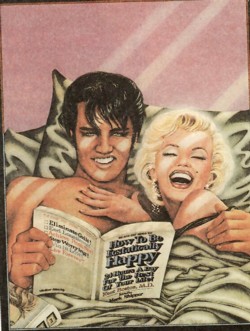 |
 |

Steven B. Roberts runs the website 'Discovering Elvis'. Go here to find out more. ""No one tracks Elvis Presley’s bizarre journey through the American psyche more imaginatively and perceptively than Greil Marcus"
No one, I think, could have predicted the ubiquity, the playfulness, the perversity, the terror, and the fun of this, of Elvis Presley’s second life: a great common conversation, sometimes a conversation between specters and fans, made out of songs, art works, books, movies, dreams sometimes more than anything cultural noise, the glossolalia of money, advertisements, tabloid headlines, bestsellers, urban legends, nightclub japes. In either form it was—is—a story that needed no authoritative voice, no narrator, a story that flourishes precisely because it is free of any such thing, a story that told itself… Steven B. Roberts - It is an absolute honor to interview you Mr. Marcus. For our readers unaware of your work, will you tell us who you are? Greil Marcus: I was born in San Francisco in 1945 and have lived my whole life in the Bay Area, as did my parents. I went to Berkeley and began writing for Rolling Stone because I was thrilled by rock & roll and bored to death by graduate school. When I realized I wasn’t cut out to be a professor, writing was all I know how to do and wanted to do. Since then I’ve written many columns on music, politics, movies, books, and more for many places, written many books, and taught (since 2000) at Berkeley, Princeton, Minnesota, and the New School in New York, where I’ll be this fall. Over the spring my two favorite records were "Bad Romance" by Lady Gaga and "Hey, Soul Sister" by Train. I found it fascinating that when I drove from Berkeley to San Francisco and back once a week, I was guaranteed to hear the Lady Gaga and Train records at least twice–but also the Doors once or twice (usually "Roadhouse Blues" or "LA Woman") and almost certain to hear "Gimmie Shelter." [Q] When was the first time you wrote about Elvis Presley? Greil Marcus: I’m not sure. The first election I ever voted in came when I bought "All Shook Up" in an attempt to keep it number one on the local charts (it lost to Chuck Berry’s "School Day"). I might have first written about Elvis in a review of the soundtrack album for his 1968 comeback show in Rolling Stone in the Spring of 1969. But though I was a devoted Elvis fan in the 50s, my eyes and then ears were really opened by a piece in Oz, a British underground magazine of the late 60s, called "America’s Real Uncle Sam,: about Sam Phillips and Sun Records. I never heard the Sun material until the late 60s. [Q] What inspired you to write Dead Elvis? Greil Marcus: I was stunned not only by the way people continued to talk about Elvis after his death, but the way his death seemed to unleash a whole Elvis fantasy life in the common imagination that wasn’t possible when he was alive and, so to speak, entitled to his own fantasies. Everywhere I looked in the 1980s, there was Elvis–songs, products, comics, cartoons, paintings, movies, jokes, radio shows–and it wasn’t the same Elvis. I started writing about it, and after ten years the book had written itself–of the times had written it. My publisher was sure it sold poorly because it had such an ugly, in your face title. Probably right, but it was always my Dead Elvis book, so there seemed no other name for it.
[Q] Myself, and other journalists, think a serious problem with the perception of Elvis is the lack of any real solid Q & A interviews. For example, he was never sat down and asked "Who is Elvis? Go…" in the style of a Rolling Stone interview for example. Elvis never told us his story. Therefore it’s always other people’s accounts. What is your opinion on this theory? Greil Marcus: He said as much about himself, and with more humor and daring, from the stage of the International Hotel in Las Vegas in 1969 than most famous people do in a lifetime of managed interviews. [Q] In Dead Elvis you make a strong point that "Elvis had always been there". Do you think the "Elvis Is Alive" movement was created out of financial opportunists to cash in on the idea "he wasn’t here anymore"? Greil Marcus: I really don’t know. I pretty much thought at the time that it was a game everyone was in on, and liked to play. Now I’m not so sure. [Q] As you pointed out in Dead Elvis, there is a lot of misinformation and myths in the Elvis World that are taken as fact without people investigating. Your analysis on Albert Goldman’s dreadful Elvis was a perfect example of this. Author, Patrick Lacy wrote a book specifically about the myths and misinformation in the Elvis World called Elvis Decoded. Have you read the book and if so, what did you think of it? - Go here to EIN's "Elvis Decoded - A Fan's Guide To Deciphering The Myths And Misinformation" Book Review Greil Marcus: I don’t know it. [Q] I was particularly fond of that part in Dead Elvis when you pointed out the idea that Albert Goldman’s whole agenda was to prove he was "hipper than Elvis". This was nothing short of being among one of the most brilliant observations that I’ve ever read. Are you glad to see that Peter Guralnick’s Last Train To Memphis and Careless Love have become the more accepted biographical accounts of Elvis now? Greil Marcus: I think I said Goldman’s Lenny Bruce book was an attempt to prove he was hipper than Lenny Bruce (since Bruce was a quintessential hipster) and his Elvis book was an attempt to prove he was better than Elvis, that is, in a class sense–which to me is more, and worse. Much of what Goldman wrote that was untrue – or rather intentional lying–has entered the common imaginating and is taken for granted. I think Peter’s books have perhaps had less effect on the psyche, but thank god they have replaced the Goldman book on shelves.
From Greil Marcus' 1981 chapter on Albert Goldman... .. But the significance of Goldman's book is not to be found in its collection of scandal.. The real significance of Goldman's Elvis is in its attempt at cultural genocide. It is Goldman's purpose to entirely discredit Elvis Presley, the culture that produced him, and the culture he helped create - to altogether dismiss and condemn, in other words, not just Elvis Presley, but the white working-class South from which he came, and the pop world which emerged in his wake. For such a task revelations about the moral weakness and ill-spent life of a single individual are useful, but no matter how numerous or squalid such revelations might be, they are not sufficient.
Greil Marcus: It was everywhere, in the US, the UK, Australia, Germany – in songs, iconography, videos, everywhere. Did Elvis go to heaven or hell was a serious question for many people in 1980 and on, and it’s a pure punk question too. [Q] Finally, what projects may we expect to see in the future from you and do you have any Elvis related projects in the future? Greil Marcus: "Bob Dylan by Greil Marcus–Writings 1968-2010″ will be published in October by PublicAffairs. It’s a collection of most of what I’ve written about Dylan outside of books. Then a short book, after the model of "When That Rough God Goes Riding–Listening to Van Morrison," which came out this spring, on the Doors. Then a short book on blackface. Then I don’t know. I write my now 26 year old column Real Life Rock Top 10 in every issue of The Believer. I will always go back to the Elvis well, but these days there’s a lot of time between trips. Click here to comment on this interview
Click here to the original article on the Discovering Elvis website
|
|
